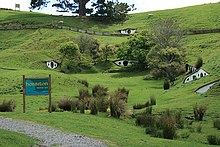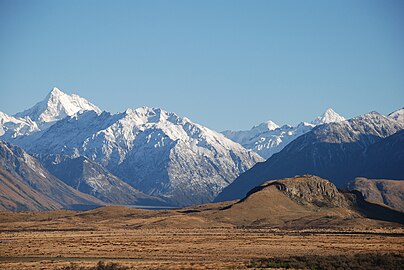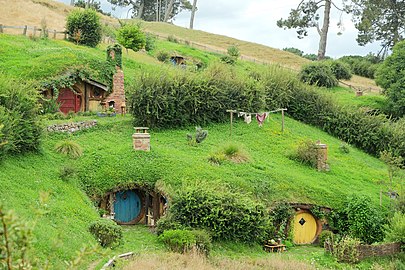Tolkien tourism

Tolkien tourism is a phenomenon of fans of Tolkien's fiction making media pilgrimages to sites of film- and book-related significance. It is especially notable in New Zealand, site of the movie trilogy by Peter Jackson, where it is credited as having raised the annual tourism numbers.
Origins
[edit]The Lord of the Rings film series by Peter Jackson, based on J. R. R. Tolkien's novel of the same name, were shot at locations throughout New Zealand. Many of these places have been preserved and altered to encourage the media pilgrimage tourism that makes up a significant portion of the country's economy. On some Lord of the Rings film location tours, tourists are provided time to indulge in cosplay, and dress as characters from the books or films.[1]
In New Zealand
[edit]New Zealand is well placed to capitalize on its scenery. Tolkien tourist attention is less geared to visiting New Zealand's national parks and more focused on scenery that was used as backdrops in Peter Jackson's films. For example, Mount Olympus is in Kahurangi National Park near Nelson in a remote corner of the South Island. Since it featured in The Fellowship of the Ring, Mount Olympus has become a spot for Tolkien tourists.[2]
Mount Sunday, in a remote area west of the Canterbury plains (upper reaches of the Rangitata Valley near Erewhon) served as the location of Edoras. Although no traces of the filming remain, complete day tour packages to it are available from Christchurch.[3]
Film NZ—the national film promotion board—advertises that New Zealand offers a kaleidoscope of urban and rural landscapes. Tourists are invited to find film locations around New Zealand with a free "Middle Earth map." Currently New Zealand is negotiating with Peter Jackson and New Line Cinema, the films' producers, to construct a permanent Lord of the Rings museum for some of the 40,000 props and costumes now warehoused in New Zealand.[4]
Economic effects
[edit]The annual tourist influx to New Zealand grew 40%, from 1.7 million in 2000 to 2.4 million in 2006, has been attributed in large part to The Lord of the Rings phenomenon.[5] 6% of international visitors cited the film as a reason for traveling to the country.[6] "You can argue that Lord of the Rings was the best unpaid advertisement that New Zealand has ever had", said Bruce Lahood, United States and Canadian regional manager for Tourism New Zealand.[5] An article published by The New York Times contradicts Lahood, stating that New Zealand subsidized the movie trilogy with $150 million.[6]
-
Mount Sunday (filming location of Edoras)
-
Mount Ngauruhoe served as Mount Doom in the films.
-
The Lord of the Rings "Hobbiton" film set was renovated and re-used for The Hobbit trilogy, and is maintained to that standard for set tours.
The Hobbit filming
[edit]Many experts and New Zealanders hoped for a renewed Tolkien effect because The Hobbit was also filmed in New Zealand.[7]
Whether or not this was vitally important to New Zealand's tourism industry was a big debating point during short-lived fears that industrial disputes could make the film production occur outside of the country. The government of New Zealand also saw some criticism for increasing movie subsidies and creating laws tailored for US movie companies, solely out of fear of losing the production. Some have subsequently called the price of $25 million (in further financial subsidies and specific laws made for the producers benefit) that New Zealand had to pay to retain the movie 'extortionate' and argued that the discussion had occurred in a climate of 'hyperbole and hysteria'.[8] An even higher price of at least $109 million has also been cited.[6]
In other places
[edit]
Tolkien tourism has existed to a lesser extent independent from the Jackson movies, in other places associated with him. Tolkien worked for much of his career in Oxford, England. The colleges where Tolkien taught, the pubs that he and the Inklings frequented, the church he attended, and his former homes in the city all attract tourist interest. The Eagle and Child pub used to capitalise on Tolkien's former patronage in its signage and interior decoration.[9]
See also
[edit]References
[edit]- ^ "Breakfast Lord of the Rings Tour". Lord of the Rings Location Tour, Twizel, New Zealand. OneRing Tours. Retrieved 16 August 2019.
- ^ "Lord of the Rings locations". doc.govt.nz. Retrieved 23 January 2020.
- ^ Charlie Gates (24 February 2017). "Lord of the Rings, Edoras tour: Lost in Middle Earth". Stuff. Retrieved 24 May 2018.
- ^ Cieply, Michael (16 February 2007). "'The Rings' Prompts a Long Legal Mire". The New York Times.
- ^ a b Gilsdorf, Ethan (9 November 2006). "Cities both big and small are offering tours of film locations". The Christian Science Monitor via USA Today. Retrieved 26 March 2010.
- ^ a b c Cieply, Michael; Barnes, Brooks (23 November 2012). "New Zealand Wants a Hollywood Put on Its Map". The New York Times. Retrieved 6 December 2012.
- ^ Milne, Jonathan (13 February 2011). "Scenery will make splash in 'Hobbit'". The New Zealand Herald. Retrieved 15 May 2011.
- ^ "Editorial: Price to keep Hobbit in NZ is extortionate". The New Zealand Herald. 29 October 2010. Retrieved 15 May 2011.
- ^ Duriez, Colin (2003). Tolkien and C. S. Lewis: the gift of friendship. Mahwah, New Jersey: Hidden Spring. pp. 77–80. ISBN 978-1-5876-8026-7.



